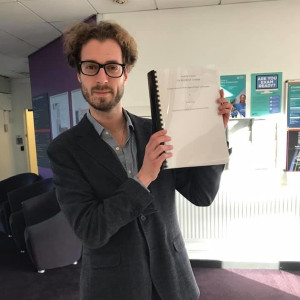Chapters
- 01. Who is Carol Ann Duffy?
- 02. Who is Medusa?
- 03. Overview
- 04. Relevant Themes in Medusa
- 05. Medusa: A Summary
Why do we read poetry? Because it's soothing, uplifting and thought-provoking. It's easy, too. Reading a novel requires commitment and staying power. By contrast, reading a few stanzas... We can do that while waiting for a bus. And then, we get to enjoy the insights we gleaned as we head off to wherever we're bound.
Why do we write poetry? In today's world of soundbites and videos, is there any point in penning rhyming verses? We can find many reasons to write verses. It helps us figure out how we feel. It helps us process the events in our lives and it's a great way to flex our vocab skills. It can also help us see the world from different perspectives.
For Carol Ann Duffy, all of these reasons and more apply. She has been writing poetry since she was a child. For her, composing verses may well be a compulsion. What makes her poetry so compelling, though? Let's look at
- the unusual structure of Medusa
- the way Ms Duffy interprets this character from Greek mythology
- what she intends to convey through her writing
- the lessons we can learn from Medusa

Who is Carol Ann Duffy?
Ms Duffy is the eldest of five children. She is a native Glaswegian whose family relocated to Stafford when she was six years old. Her father was an avid football fan; when he wasn't engaged in his electrician work, he coached the local team. He also stood for Labour candidacy to the parliament but didn't get the votes.
Her childhood and education were conventional, marked only by her love for reading and early writing precocity. Like the Romantic poet Percy Shelley, teachers caught on quickly to Ms Duffy's genius at writing verses. However, unlike him, they weren't afraid to approach her. Indeed, they nurtured her writing skills and encouraged her to achieve her dream of becoming a writer. She became a published author at 15 years old.
Of course, that's hardly old enough to rest on one's laurels. And besides, there was so much more to be said! Our author enrolled in the University of Liverpool to study philosophy. But she couldn't keep her pen still. While studying, she wrote plays, two of which were staged at the Liverpool Playhouse. She wrote other treatises, too.
After earning her Honours degree in Philosophy, she plunged headlong into the world of writing. There was a stint as a poetry critic for The Guardian and as the editor of Ambit, a poetry quarterly. Soon came a lecturer appointment at the Manchester Metropolitan University and, later, she became their Writing School's creative director.
If ever there were a writer destined for authorship, Ms Duffy would be it. That's not to discount her hard work and effort, though. But we have to acknowledge her unique voice. And the perspective she gives to matters thought to be long since settled.

Who is Medusa?
The character Medusa is one of the Gorgons’ three sisters from Greek mythology. Their parents produced another trio of sisters; the ones that shared one tooth and one eye between them. Presumably, the three Gorgon sisters were winged beasts with snakes for hair. But that, and the rest of Medusa's story is less certain.
According to Prometheus Bound, written sometime between 479 and 425 BCE, all three sisters were beastly looking and had snakes for hair. However, an earlier writing (490BCE) states that Medusa had fair cheeks. And even before that, the Roman poet Ovid describes her as beautiful and a maiden. In that version, her hair became a snaky mess only after a sexual transgression in Athena's temple.
Medusa is a confounding character. She and her Gorgon sisters were born of earth, yet Medusa was mortal - the only one among them who was. She was carrying Poseidon's seed - he was her partner-in-tryst in Athena's temple, but he did not intercede on her behalf. And after she is beheaded, her power remains steadfast.
Obviously, there's much more to Medusa's story. A beastly hag with snakes for hair is able to seduce the god of the sea? So much of this tale contradicts older writings (and defies logic!) that it must compel an alternate take. Lucky for us, Carol Ann Duffy tells Medusa's story so that we find sympathy for this supposedly monstrous character. Sympathy that might be hard to muster for Charlotte Mew's farmer.
Medusa
A suspicion, a doubt, a jealousy
grew in my mind,
which turned the hairs on my head to filthy snakes
as though my thoughts
hissed and spat on my scalp.
My bride’s breath soured, stank
in the grey bags of my lungs.
I’m foul mouthed now, foul tongued,
yellow fanged.
There are bullet tears in my eyes.
Are you terrified?
Be terrified.
It’s you I love,
perfect man, Greek God, my own;
but I know you’ll go, betray me, stray
from home.
So better by for me if you were stone.
I glanced at a buzzing bee,
a dull grey pebble fell
to the ground.
I glanced at a singing bird,
a handful of dusty gravel
spattered down.
I looked at a ginger cat,
a housebrick
shattered a bowl of milk.
I looked at a snuffling pig,
a boulder rolled
in a heap of shit.
I stared in the mirror.
Love gone bad
showed me a Gorgon.
I stared at a dragon.
Fire spewed
from the mouth of a mountain.
And here you come
with a shield for a heart
and a sword for a tongue
and your girls, your girls.
Wasn’t I beautiful
Wasn’t I fragrant and young?
Look at me now.

Overview
Medusa is told in the first person as a dramatic monologue by a seemingly insecure woman. She's worried that her husband is cheating on her. The poem begins: ‘A suspicion, a doubt, a jealousy’; it is this jealousy which has turned the woman into a monster. Now, everything she looks at turns to stone. That doubt echoes throughout the poem, as exemplified in the line ‘but I know you’ll go, betray me, stray from home’.
We don't fear this supposedly monstrous character. This poem evokes empathy for the obviously insecure being she is. She is clearly distressed and suffering, especially as she reminisces about the time she was young and beautiful. The last stanza lays bare her complete lack of confidence. Nevertheless, she is presented as a foul, malign entity who threatens the reader with the line ‘Be terrified’.
The poem ends, dramatically, with the line ‘Look at me now’ which has a double entendre (double meaning). It could be read as a cry of despair - a spurned lover begging to be seen. Or, as a threat – if you did look at Medusa, you would die. Standing as it does, on its own at the very end of the work, leaves the reader feeling conflicted.

Form and Structure
The poem is written in free verse. The poem is divided into seven stanzas of roughly equal length. The first verse has only five lines and the last comprises just one: ‘Look at me now’. There is no formal rhyme scheme. However, Ms Duffy creates a rhyming effect through assonance, consonance and internal rhyming.
As we read through the poem, the importance of the living things Medusa turns to stone grows. It starts with a bee, progresses to a dragon and then, ultimately, to the cheating husband himself. After that escalation, the lone last line provokes a chill. It gives the poem a dramatic ending, leaving the audience unsure whether to feel threatened by or feel sorry for Medusa.
Language
As noted above, the poem itself doesn't have a rhyming scheme but is packed full of rhyme. We find half rhymes, internal rhymes and, in stanzas 3, 4, 5 and 6 some end rhyme. This rhyme helps to unify the lines and create a sense of rhythm. The end rhyme produces a sense of finality connected with the death of her victims.
Sibilance is particularly used in the first two stanzas to create the sound of a hissing snake. Tricolons (groups of three) help develop the rhythm in the poem. E.g. ‘A suspicion, a doubt, a jealousy’. In this case, the rule of three also emphasises the power of emotions that Medusa is overcome with. Ultimately this is what turned the lady into a gorgon.
Rhetorical questions, e.g. ‘Are you terrified?’ are used to involve but also intimidate the reader. The last two rhetorical questions in the poem: ‘Wasn’t I beautiful? Wasn’t I fragrant and young?’ could be addressed to her husband, begging him to show her some affection. Like the narrator in Thomas Hardy's Neutral Tones, bitterness mingles with disillusionment to create an abject, pitiable creature.
Those questions could just as readily be addressed to the reader. She longs to be comforted; those queries express the horror she feels by this change in herself. They may even reflect self-doubt, as though she can no longer believe she was that way, once.
The oxymoronic metaphor ‘bullet tears’ emphasises the danger that Medusa brings. They call forth the searing heat a just-fired bullet creates. Conversely, they remind us that bullets cause enormous pain. This word pair evokes sympathy from the reader because of her suffering.
Relevant Themes in Medusa
Jealousy is obviously a dominant theme for Medusa. By all appearances, the target of her ire is good-looking, a perfect man, a Greek God. He has weapons and defences and is cloaked in girls. We wonder if Medusa is jealous of the other girls or of the attention her man lavishes on them.
Doubt is the predominant theme. Medusa doubts herself for the jealousy she feels. She also doubts her man is faithful to her. That hints at possible former betrayals that led her to feel insecure. Her final, plaintive questions - "Wasn't I..." leaves us wondering if she falsely remembers that version of herself.
Impotent rage heats each verse. She wants her man to fear her lethal power. She wishes he would turn to stone to spare her another betrayal. The common items, the creatures she shifts her gaze to disintegrate under her mutinous stare. She demands for him to be afraid of her.
There is also an element of self-loathing. Far from revelling in her power to destroy at a glance, Medusa looks around at what she's wrought. She sees no cause for glee, no victory in the disaster. Much as Seamus Heaney wished for calm weather to return after the Storm on the Island, she wishes for a return to her former gentle self.
And, finally, betrayal. William Congreve (near-approximately) wrote 'Hell hath no fury like a woman scorned'. Carol Ann Duffy's Medusa is scorned but she is powerless. Her fury remains in her mind, acts of terrible violence only imagined. She turns the violence inward by torturing herself with visions of the filthy beast she surely must be.

Medusa: A Summary
The whole poem delivers a stop-motion series of explosive events, with each fresh horror demanding its share of attention. It is an exposé of a jealous woman who is grieving for her partner. Her rage at betrayal compels her to turn against him. But who is the monster in this story? Medusa or the perfect man - Greek God? The metaphor describing her husband’s heart as a shield suggests that he didn’t love her properly.
Medusa tells the story in the first person, but not very clearly. In the first stanza, she says she has 'a suspicion, a doubt, a jealousy'. In the third stanza, she asserts she knows he will go, betray her and stray from home. And in the penultimate verse, 'your girls, your girls'. But we don't know if her man has, indeed, strayed. We only know there's a suspicion of betrayal. It's that suspicion that turned her into a Gorgon.
This poem comprises seven stanzas, written free-verse-style. The first stanza contains five lines, the next five have six apiece. The final stanza is a single line long. There is no enjambment to propel the reader forward.
However, the poet makes clever use of language. She uses a number internal rhymes to achieve a rhythmic effect. She employs sibilance to simulate the snakes emerging from Medusa's head. Tricolons give the impression of instability and uncertainty. Metaphors are used to deliberately obfuscate. Who do the bullet tears hurt the most? The one they're shed over or the one who sheds them?
Ms Duffy makes judicious use of the Rule of Three, a rhythmic repetition of similar concepts. The very first line of the poem is the most obvious example of such but the fourth and fifth stanzas follow that pattern, too. Only there, it takes the form of a glance, an object and a result.
Overall, the poem is distressing for the reader as we see a lady who has become paranoid through jealousy. This emotion presumably damages her relationship with her husband. It does nothing for her own well-being as she struggles to find a lost identity. Don't we wonder, though, where this take on this ancient Greek tale originate?
While still in her teens, Carol Ann Duffy fell head over heels in love with a certain poet. In fact, he was the reason she chose the University of Liverpool for her higher education studies. He was a member of the Liverpool Poets; she would be close by.
They stayed together for ten years. She credits him with helping her build her self-confidence. They talked poetry incessantly. For someone as literary-minded as she, it was pure bliss. The only trouble was, he wowed plenty of other females, too. As Ms Duffy said, "He thought poets had a duty to be unfaithful.".
How much did his straying shape her Medusa narrative? Did she, at one time, see herself incinerating cats, pigs and bees with just a glance? We'll never know, of course. Like Robert Minhinnick's Yellow Palm, these deceptively simple verses may disguise a universe of pain.
We hope these ideas have been useful and have helped you reflect in a bit more depth on what Carol Ann Duffy is trying to present. Why not have a read of some of the other poems in the collection? There are loads of them and some are great fun. See if you can find any parallels or contradictory meanings! Need an extra hand understanding poetry? Why not book a GCSE English tutor to come to your home from the Superprof website?
















As a Student, I enjoyed reading this article. It helped me expand my knowlage of the poem that i’m studying.
glad it helped! ❤️
As a Student, I enjoyed reading this article. It helped me expand my knowlage of the poem that i’m studying.